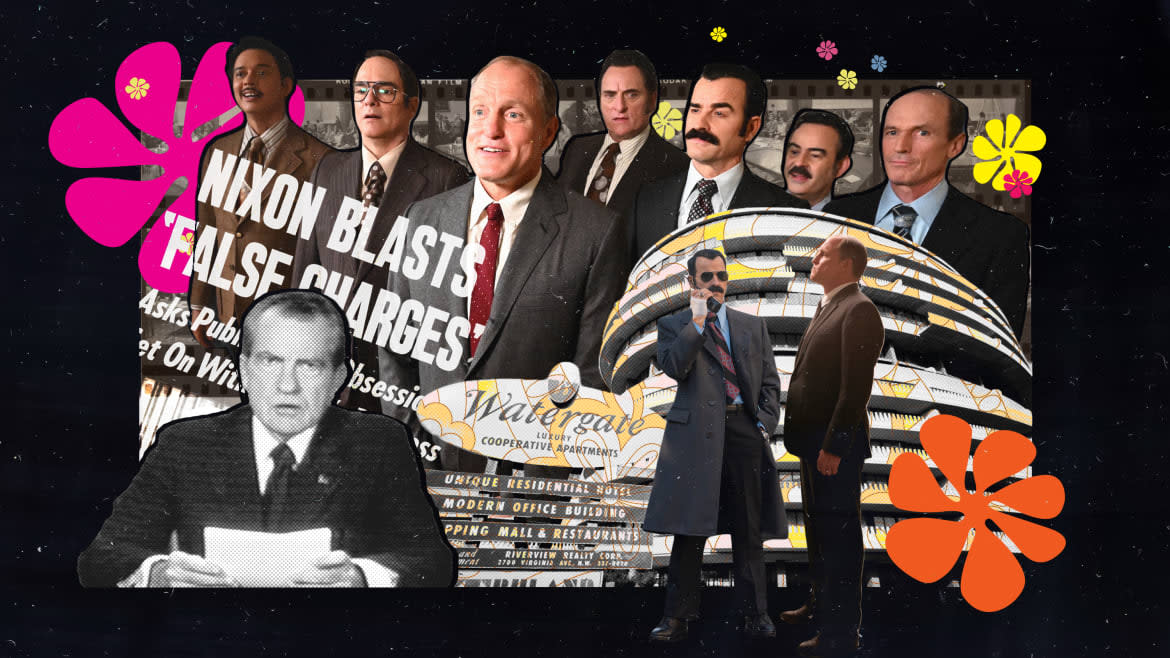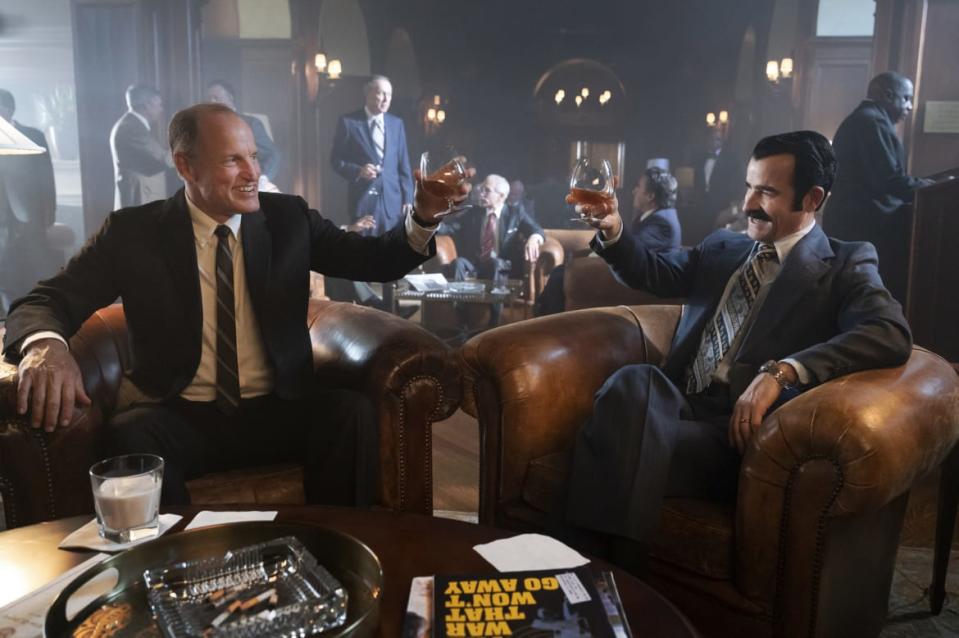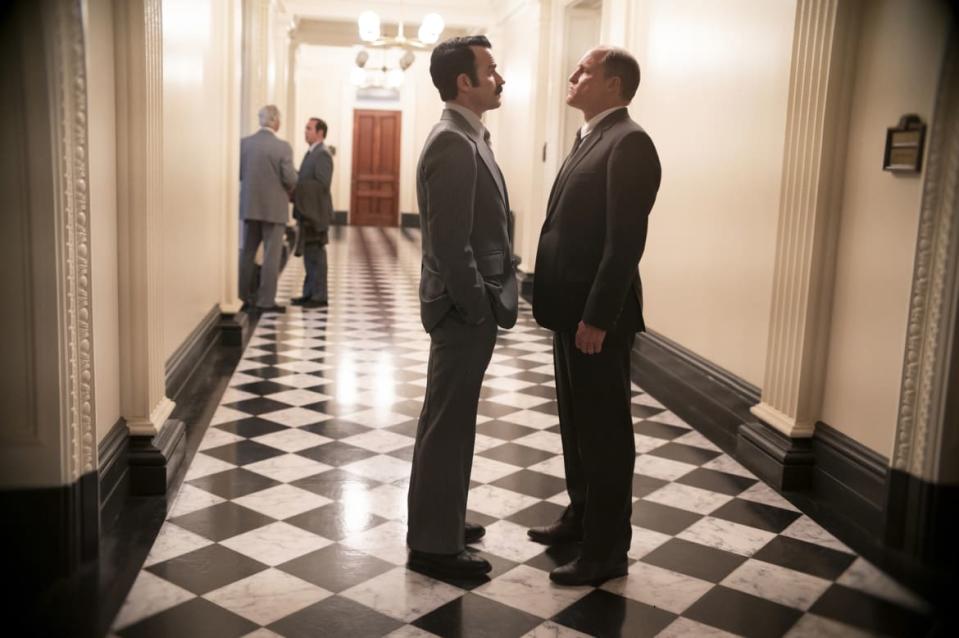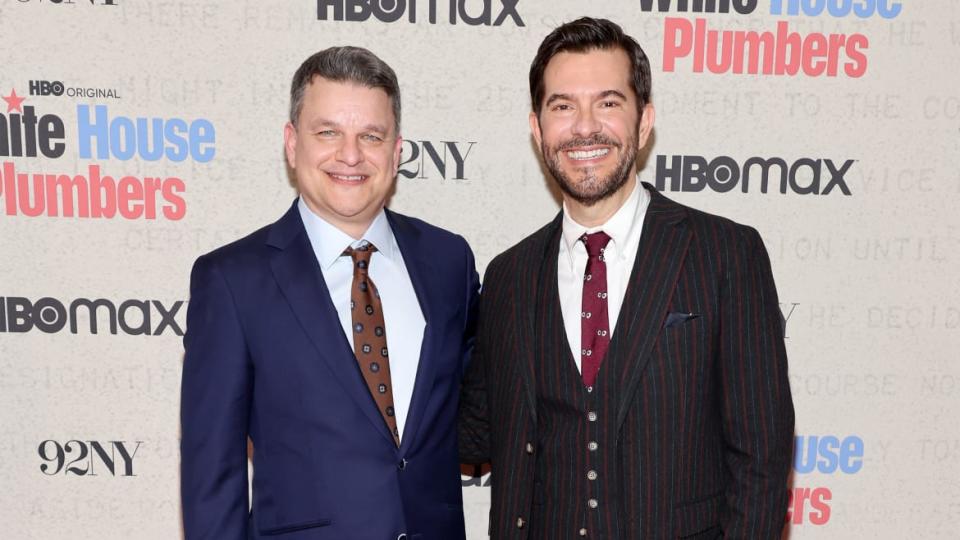‘White House Plumbers’: It Turns Out the Watergate Break-In Is Secretly Hilarious

- Oops!Something went wrong.Please try again later.
- Oops!Something went wrong.Please try again later.
- Oops!Something went wrong.Please try again later.
- Oops!Something went wrong.Please try again later.
- Oops!Something went wrong.Please try again later.
The hottest spot in prestige television right now is the Watergate Hotel. At least, that’s what the nearly back-to-back releases of Starz’s Gaslit and HBO’s White House Plumbers might make you think. Both series are inspired by the Watergate scandal, which led to President Richard Nixon’s resignation in 1974. Despite their superficially similar premises, there’s little in common between these two shows—to the HBO limited series’ benefit.
In the expansive canon of Watergate-inspired media, White House Plumbers hews more closely to the comedy Dick than dramatic pieces like Frost/Nixon or Oliver Stone’s 1995 Nixon biopic. (In fact, Nixon never appears in this take on the story.) Last summer’s Gaslit, starring Sean Penn and Julia Roberts, aimed for something akin to those latter films. But its portrayal of a variety of figures inside of the Nixon administration—from counsel John Dean to Attorney General John Mitchell, his publicly abused wife Martha, and Chief of Staff Bob Haldeman—proved messy.
White House Plumbers serves as a course correction. It takes a more character-focused, All the President’s Men-like tack to telling the story: It zeroes in on the two men that bungled the break-in, majorly messing up the attempted burglary of the Democratic National Convention’s headquarters. The result is a more unique contribution to the overwhelming number of Watergate scandal retellings.
Howard Hunt (Woody Harrelson) and Gordon Liddy (Justin Theroux) star as the bumbling pair of hopeful Nixon insiders, who are tasked with beefing up Nixon’s election campaign. But the failed ex-CIA and FBI agents, respectively, aren’t the most qualified for the job; White House Plumbers captures Hunt and Liddy’s absurd hijinks to a hilarious T, all the way to their criminal sentences for the busted break-in.
Co-creators Peter Huyck and Alex Gregory have a long history in comedy writing, which helped create this tone. The pair started working together on The Late Show with David Letterman in the ’90s, where they regularly captured the innate wackiness that is American culture, especially its politics. This is their first project since working in the Veep writers’ room, where they honed their political satire skills. (And for those wondering: No, the pair hasn’t seen Gaslit, and they don’t plan on it.)
Monday night’s episode finally portrayed the break-in itself. The Daily Beast’s Obsessed chatted with Huyck and Gregory about making such a scandalous event funny, how they managed to make the bad guys likable, and which other political scandal deserves the comedy treatment. This interview has been edited for length and clarity.
While there is funny Watergate-related material out there—like the 1999 comedy classic Dick—most takes on the scandal are more serious. Why did you both decide to go with a humorous tone for White House Plumbers?
Peter Huyck: Our goal when we set out to make it was to write it straight and, whatever the scenes were and whatever the characters were doing, not try to add jokes, like we would’ve done at Veep.
‘White House Plumbers’ Looks for the Laughs in Watergate
But Hunt and Liddy were such preposterous characters that the scenes ended up being funny, because they are wearing wigs and planning sex boats to undermine the Democrats. All of their big ideas were bizarre, and they were really ridiculous characters, especially Liddy. So those scenes all end up being funny, but that’s just us writing them as we would imagine they would’ve happened, and they just happened to be really funny.
Why did you want to focus on Hunt and Liddy in the first place, as opposed to other players in the events of Watergate?
Alex Gregory: They’re the more interesting characters, compared to what’s going on in the White House. [The story of what happened to those inside the Nixon administration] was basically a scandal and a coverup—that’s not really the freshest thing. Whereas the notion of an ex-CIA agent, who took the fall for the Bay of Pigs, and an FBI guy, who got washed out of the FBI because he got arrested, [was more interesting].
They’re also the most accessible characters in the whole thing. As eccentric as they are, I think the average person connects to two guys that are thrown together. They’re told to do a job. They go, “I don’t necessarily like or trust this guy, but I really wanna impress my bosses. I haven’t had the career I wanted. … This is my one chance to make it.” That’s much more of an accessible story to the average person than, “I’m the counsel to the president.”

Definitely. And Hunt and Liddy were also more involved with the mad-cap action of the break-in than John Dean or John Mitchell were.
Huyck: Yeah. Both [Liddy and Hunt] have these disastrous backstories, and they’re put in charge of dirty tricks. No one should be surprised that it didn’t go well.
It takes until Episode 3 to actually show the break-in, but any American watching knows from the start that Hunt and Liddy are not the good guys. Were there challenges in getting us to root for them, as our main characters?
Gregory: We had a meeting with a director who said, “I worry that you’re making these guys too likable.” In order to tell a cautionary tale, you have to at least understand and identify the protagonist, even if they’re a villainous anti-hero. You have to treat them with a certain amount of empathy and understanding, because if you just start out with them as monsters, you don’t invest in their journey.
You kind of want them to succeed, in order to bring the viewer along on that journey and get to the gut punch of Nixon’s not coming. You really have to want Nixon to come to the rescue, or, emotionally, the whole thing collapses.
How Do You Dress a Nazi-Fighting Nun?
Huyck: I would say also, as much as they were obviously bumbling, and we all know how the story ends, we did want to show that there were moments where they were capable and smart and and succeeded in certain elements, so you understand why they were given the opportunity.
[That’s why] Episode 2 is all about the Dita Beard crisis. That could have taken out the Nixon administration before the 1972 election even happened. [Showing that event helps] you understand why everyone in the White House thought these guys are pretty capable. They work in a slightly unorthodox fashion, but they do get results.
Very unorthodox.
Huyck: That first break-in was pretty smart. They set up an entire fake banquet in a different part of the building, so they could be there after hours, and then sneak in and get access to the DNC. It was pretty brilliant. They had movies playing, they had dinner, they had drinks—everything was lined up.

It’s just that the DNC staffers worked too late that night, and [Hunt and his team] actually got locked into the banquet hall, into the liquor closet. They actually did have to urinate in whiskey bottles. All of that really happened.
But the plan initially was smart and it could have worked. They were so close to pulling it off.
They even got close on the final attempt—if only they hadn’t left that tape on the door. They should have used silver tape! It’s less obvious!
Gregory: So many of [Hunt and Liddy’s] mishaps occurred because of budget cuts. Like the fact that they used [Nixon’s head of security] James McCord, because he was already on the payroll—[they used him] instead of hiring an outside person, whose bugs might have worked. [Bernard “Macho” Barker, one of the burglars,] didn’t want to waste batteries, so he turned off his walkie-talkies—so they were not able to warn them that cops were in the building. This is the fallout of when you cheap out on this grand vision.
A big part of the blunder, of course, is the foolhardiness of Gordon Liddy. Most portrayals of him render him as a caricature—big mustache, intimidatingly emotionless. Did you both want to avoid leaning into parody with White House Plumbers’ take on Liddy?
Huyck: I think we did, yeah. The thing that’s interesting about Liddy and Hunt is that Hunt is, on the surface, a more capable guy. But his family life was very messy—whereas Gordon Liddy is, on the surface, a totally absurd character, but his family life was very strong. He was a great husband. He was very committed to his wife. That doesn’t humanize him or excuse any of the crazy stuff he was doing, but it does let you understand him as a person, so it’s not just, “Here’s this goofball with a mustache lighting his hand on fire all the time.”
The Cult of Simone Kessell: The ‘Yellowjackets’ Star on Lottie’s Inner Antler Queen
Gregory: Once you see [Gordon Liddy and his wife Lydia, played by Judy Greer] together, you believe their dynamic. [But when] you see the kids, you [realize] he’s playing a role even in front of his family. The only times you see his guard really come down are with Hunt, when he is talking about being bullied as a child and how it fueled him to create this Ubermensch persona.
Those are some of our favorite moments in the show, when both guys let their guard down with each other. You see how much this whole thing means to them, because of the wounds they both have.
Someone we never get to see come into the story is President Nixon himself, outside of archival footage. Was this intentional, to not have someone play Nixon on-screen?
Gregory: The joke was originally going to be that we’d have President Richard Nixon [appearing] as himself. [We would] use his audio tapes and only film the microphones or a pant leg in the Oval Office.
But it just ended up being that this is Hunt and Liddy’s story, and from their perspective, they never meet him in this journey. He’s an idea and an icon, and so for them, it’s more like Nixon is whispered about to them—“The President wants you to do this”—and that’s their experience of Nixon. He isn’t a person to them.
Huyck: Also whenever you have someone that is that iconic and that recognizable, and you have an actor portraying him, it’s very hard not to feel like it’s a caricature or someone. It just takes you out of the reality [of the show], I think. We felt like [if we had] any scenes with an actor portraying Richard Nixon, you’re just gonna check out on the reality of the show.

Whereas I think that even though you know Woody Harrelson and you know Justin Theroux, hopefully, if we’ve done our jobs, you really buy into them and the story, and you go on theit journey.
I agree that putting Nixon on-screen can be distracting. Lastly: What do you think would be another interesting political event to give the White House Plumbers treatment to—something that we as a culture don’t yet understand the real absurdity of?
Gregory: We can’t tell you, because if we tell you, then someone else might Gaslit it. [Laughs]
Huyck: To me, in 40 years, the Rudy Giuliani story is gonna be a great limited series. As a New Yorker, when he became mayor, he was respected—he was America’s mayor. And then to see what became of him, giving speeches in front of a [sex shop] with hair dye running down his face—that is a great story. We are way too close to it, but down the road, that is a very funny story to tell.
Keep obsessing! Sign up for the Daily Beast’s Obsessed newsletter and follow us on Facebook, Twitter, Instagram and TikTok.
Get the Daily Beast's biggest scoops and scandals delivered right to your inbox. Sign up now.
Stay informed and gain unlimited access to the Daily Beast's unmatched reporting. Subscribe now.

